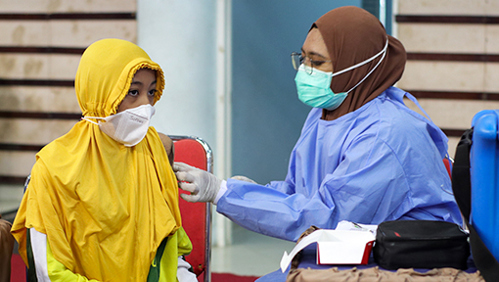
Nearly one in four Indonesian adolescents didn’t seek health care when they thought they needed it over the past year, according to new research led by Burnet Institute and collaborators across Australia and Indonesia.
Over 2,000 adolescents in Jakarta and South Sulawesi aged between 16 and 18 years participated in the study.
The research is understood to be the first of its kind in Indonesia, said Burnet Institute’s Dr Minh Duc Pham, lead author of the study published in The Lancet Regional Health – Southeast Asia.
Both adolescents attending school and those out of school were surveyed as part of the research, which revealed a range of reasons for not seeking seek care.
“Adolescents attending school were more likely to say they didn’t seek health care because they thought the problem would go away, or they were afraid of what the doctor would say,” Dr Pham said.
“Adolescents out of school often said they didn’t know who to see to get care, lacked the ability to pay for it, or didn’t have transport to access health care.”
Analysis of the survey results found that some adolescents were at higher risk of not seeking care than others.
This included those who had been subject to multiple types of victimisation, for example physical violence, sexual abuse and bullying; and those who had previously sought care for mental health needs.
“Our findings highlight that adolescents who may benefit most from healthcare reported many instances where they did not access the care they needed,” said Professor Peter Azzopardi, the project lead and Burnet honorary.
“Indonesian adolescents - like all adolescents globally - expect confidential, welcoming and friendly services when seeking health care.”
Professor Azzopardi said a unique focus of this study was out-of-school adolescents, often not included in research efforts.
“For adolescents out of school, targeted community-based information, education and communication programs are needed to provide them with information about how to seek help and improve their access to it,” he said.
Dr Pham and his co-authors also called for strategies to enhance the quality of health care delivered by the Indonesian health system to better meet adolescents’ healthcare needs.
Study co-author Dr Fransiska Kaligis from the Department of Psychiatry, Universitas Indonesia, notes that Indonesia is the fourth most populous country in the world and home to 68 million adolescents.
According to the available data from the Global School Health Survey, seven percent of 16–17-year-olds had seriously considered attempting suicide in the preceding 12 months (WHO, 2015), and the national RISKESDAS survey found that one in ten Indonesian 15−24-year-olds have a non-specific emotional disorder (Indonesian Ministry of Health, 2018).
“This study’s findings highlight the need for research and efforts to strengthen health care for young people, and provides useful information for Indonesian policymakers to put special attention to improve adolescent mental health,” Dr Kaligis said.

